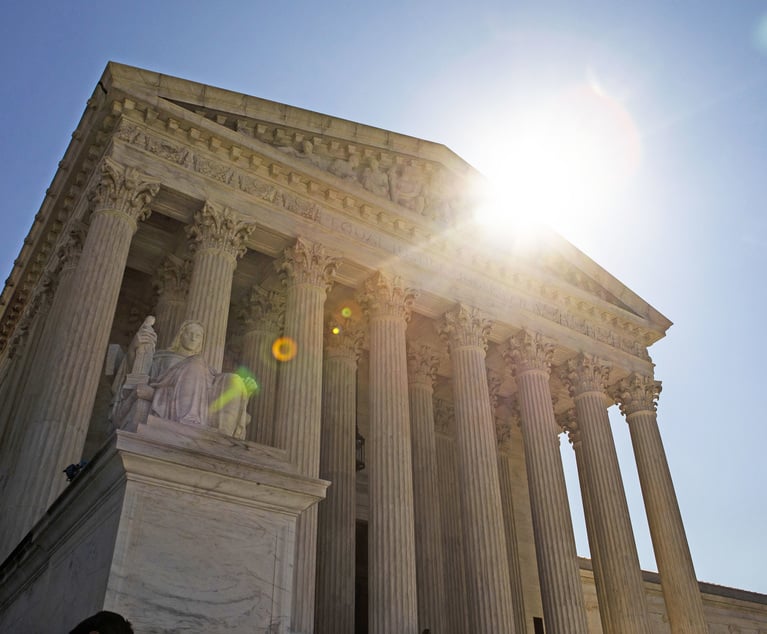Features

U.S. Supreme Court Agrees to Decide Video Privacy Suit Against Paramount
The U.S. Supreme Court will consider if Internet users can sue websites for sharing their data with Facebook under the 1988 law aimed at protecting customers' private video rental history.
Features

Recent Supreme Court and Second Circuit Decisions Have Reshaped Wire Fraud and Honest-Services Fraud Law
The limits on wire fraud prosecutions are continuing to evolve, with courts pushing back on further narrowing the scope of the wire fraud statute post-Ciminelli and Percoco.
Features

Supreme Court Asked Again to Extend Copyright Protection to AI Works
A computer scientist is asking the U.S. Supreme Court to extend copyright protection to works created entirely by artificial intelligence in one of the first cases to reach the justices about the revolutionary technology.
Features

High Court Expands the Reach of the Wire Fraud Statute (Part III)
On May 22, 2025, the Supreme Court endorsed the “fraudulent inducement” theory of wire fraud in Kousisis v. United States, departing from its recent trend of narrowing the scope of broadly worded criminal statutes, including the wire fraud statute. This decision appears to allow the government to obtain a conviction even where the defendant did not intend to cause economic harm to their counterparty, so long as the defendant made material false statements in order to obtain property from another.
Features

Supreme Court: Statements Made to FDIC Need to Be “False,” Not Just “Misleading”
This article describes the prosecution in Thompson, then turns to the Supreme Court’s rejection of the government’s contention that 18 U.S.C. §1014 criminalizes misleading as well as false statements.
Features

BONUS CONTENT: High Court May Limit the Reach of the Wire Fraud Statute: Post-Argument Update
A follow up to the article on a briefing in 'Kousisis v. United States' before the U.S. Supreme Court that considers the viability of the fraudulent inducement theory. Arguments before the Court took place on Dec. 9, and the authors provide an update.
Features

Secondary Liability for Copyright Infringement At the Supreme Court
In February 2024, the Fourth Circuit addressed a jury’s 2020 damages award of $1 billion finding Cox secondarily liable for its subscribers’ copyright infringement through illegal copying of copyrighted songs. Both Cox and Sony filed petitions for certiorari.
Features

High Court May Limit the Reach of the Wire Fraud Statute
On Dec. 9, 2024, the Supreme Court will hear argument in Kousisis v. United States, a case that will again review the reach of the federal mail and wire fraud statutes. At issue this time is the so-called “fraudulent inducement” theory of property fraud — namely, whether deception to induce a commercial exchange can constitute mail or wire fraud, even if the infliction of economic harm on the alleged victim was not the object of the scheme.
Features

Impact of Supreme Court's Ruling On Expert Intent Testimony In 'Diaz v. United States'
The Supreme Court held that expert testimony in a criminal case, as to whether "most people" similar to the defendant have a particular mental state, does not run afoul of the Federal Rule of Evidence's prohibition against expert opinion evidence about whether a criminal defendant had or lacked the mental state required for conviction. Particularly in white-collar cases, where the defendant's intent is often the central disputed issue, the implications of Diaz may be far-reaching.
Features

U.S. Supreme Court Ruling Empowers Developers and Property Owners to Challenge Excessive or Unjustified Impact Fees
The recent U.S. Supreme Court ruling in Sheetz v. County of El Dorado will cause many local governments to revisit the defensibility of their impact fee regimes.
Need Help?
- Prefer an IP authenticated environment? Request a transition or call 800-756-8993.
- Need other assistance? email Customer Service or call 1-877-256-2472.
MOST POPULAR STORIES
- The DOJ's Corporate Enforcement Policy: One Year LaterThe DOJ's Criminal Division issued three declinations since the issuance of the revised CEP a year ago. Review of these cases gives insight into DOJ's implementation of the new policy in practice.Read More ›
- The DOJ's New Parameters for Evaluating Corporate Compliance ProgramsThe parameters set forth in the DOJ's memorandum have implications not only for the government's evaluation of compliance programs in the context of criminal charging decisions, but also for how defense counsel structure their conference-room advocacy seeking declinations or lesser sanctions in both criminal and civil investigations.Read More ›
- Use of Deferred Prosecution Agreements In White Collar InvestigationsThis article discusses the practical and policy reasons for the use of DPAs and NPAs in white-collar criminal investigations, and considers the NDAA's new reporting provision and its relationship with other efforts to enhance transparency in DOJ decision-making.Read More ›
- Mixed Ruling in Jefferson Starship Band Name SuitWhat's in a rock band's name? Plenty, if you are talking about Jefferson Starship, which goes back more than 40 years, has had more than 30 members and was born from the 1960s psychedelic rock band Jefferson Airplane.Read More ›
- Strategy vs. Tactics: Two Sides of a Difficult CoinWith each successive large-scale cyber attack, it is slowly becoming clear that ransomware attacks are targeting the critical infrastructure of the most powerful country on the planet. Understanding the strategy, and tactics of our opponents, as well as the strategy and the tactics we implement as a response are vital to victory.Read More ›
